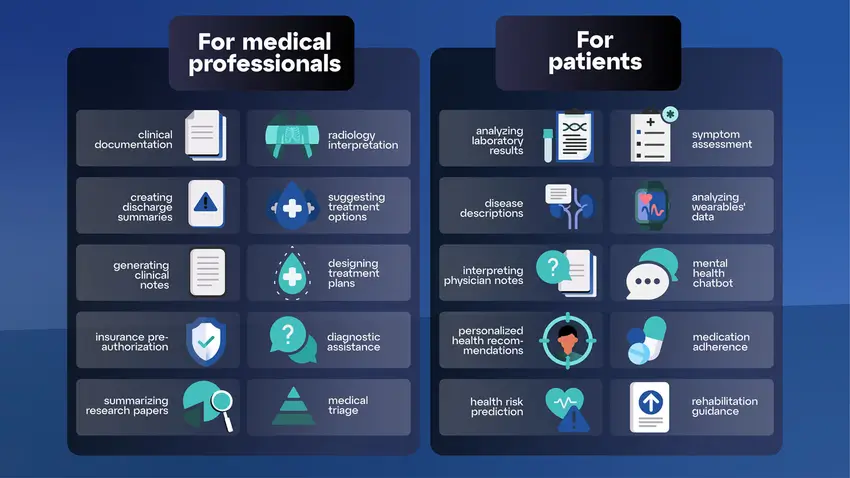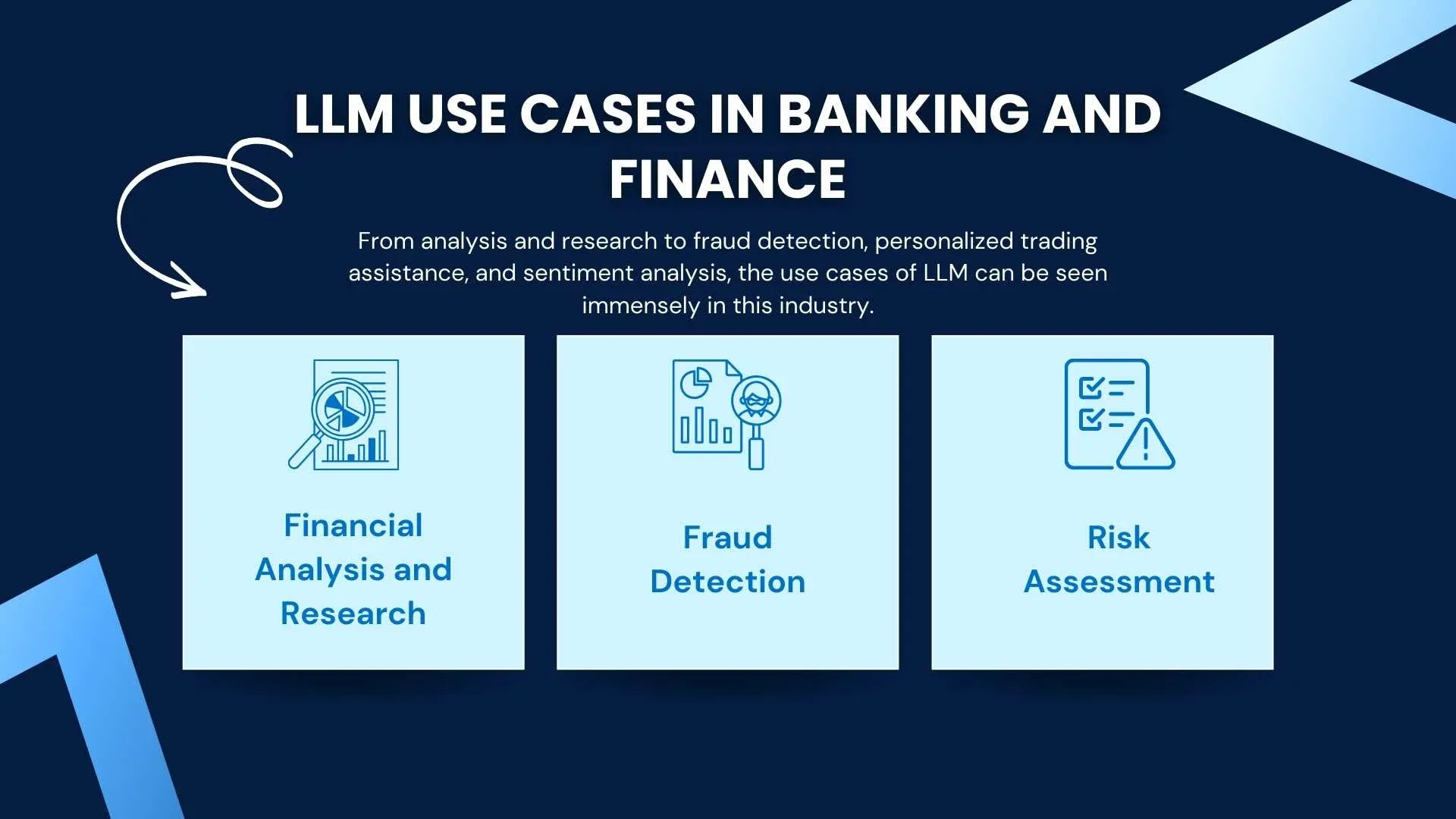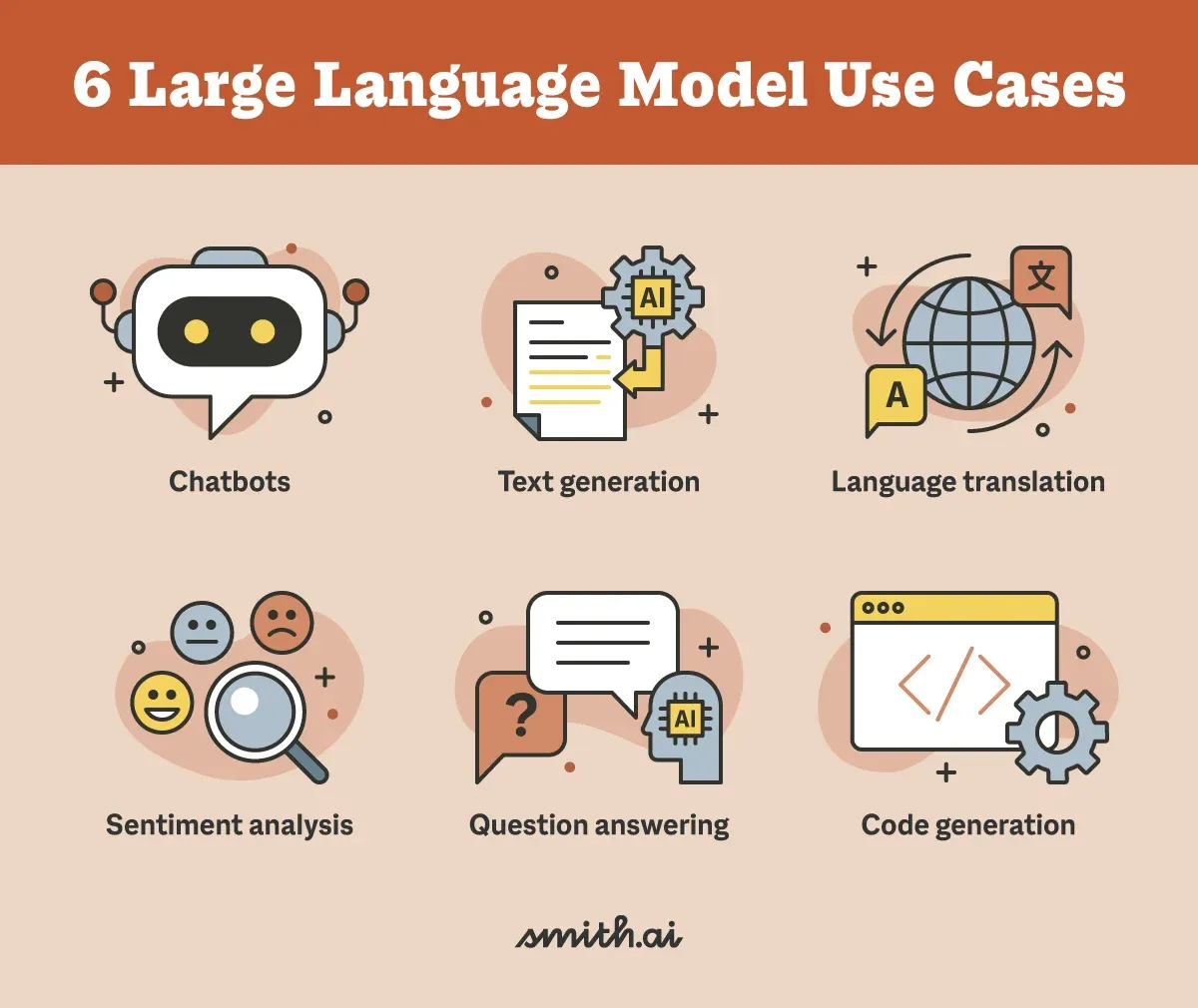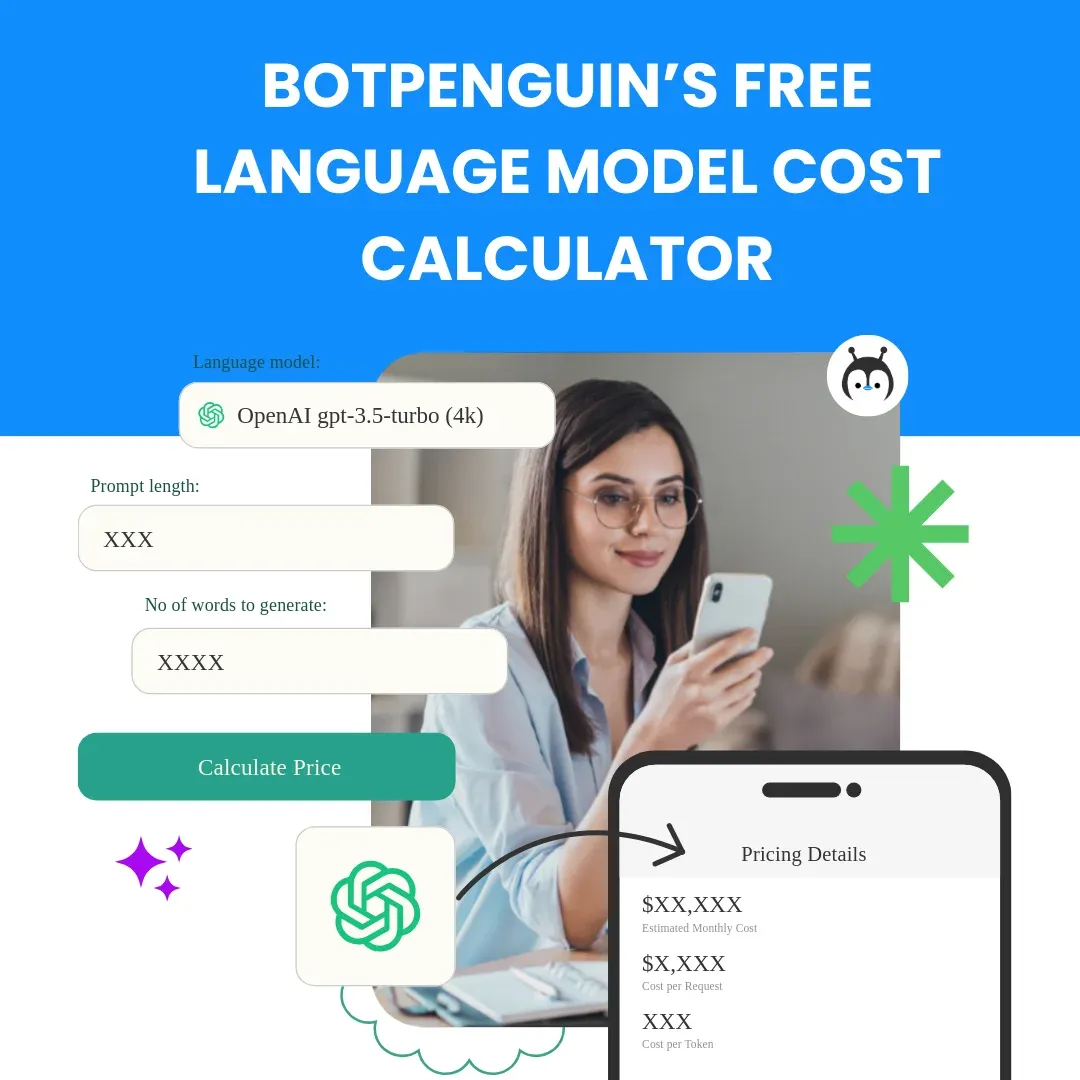Large language models (LLMs) are taking the business world by storm. Companies across industries are turning to these powerful AI systems to drive innovation and gain competitive edges. But what exactly are LLMs, and how are leading organizations using them?
This post will explore the top 10 business uses of LLMs today. We'll look at real-world examples of how healthcare systems, financial institutions, law firms, schools, marketing agencies, customer service teams, media companies, HR departments, governments, and automakers are deploying LLMs to enhance their operations.
From personalized medicine to fraud prevention, legal research, adaptive learning, content creation, customer support, original media production, recruiting, policy analysis, self-driving cars, and much more - LLMs are delivering transformative capabilities. We'll see the vast potential of LLMs to automate processes, analyze data, generate insights, and communicate like humans across domains.
Join us on an illuminating tour of how LLMs are shaping the future of business and society. The AI revolution is here and LLMs are at the forefront, driving innovation and unlocking immense value.
Learn how leading organizations are harnessing the power of LLMs to gain competitive advantages and provide next-level services. Let's dive in!
1. LLM Use-Cases in Healthcare

The healthcare industry is one of the early adopters of LLMs, leveraging their capabilities to improve patient care and outcomes. LLM technology is used in various applications, such as medical image analysis, natural language processing, and predictive analytics.
One area where LLMs have been particularly effective is in the analysis of Electronic Health Records (EHRs). By analyzing EHRs with LLMs, healthcare professionals can identify patterns and insights that would have otherwise gone unnoticed.
For example
Personalized Medicine: An LLM analyzes a patient's genetic data and medical history to suggest targeted treatment options and predict potential health risks. This personalized approach leads to more effective and preventative care.
Mental Health Chatbot: An LLM-powered chatbot provides 24/7 emotional support, offers cognitive-behavioral therapy techniques, and flags potential mental health concerns for further professional intervention. This increases access to mental health resources and early intervention.
2. LLM Use-Cases in Finance

The finance industry also uses the power of LLMs to automate tasks, analyze data, and make more informed decisions. LLMs are used in various applications, such as fraud detection, stock market prediction, and risk analysis.
One area where LLMs have been particularly effective is in fraud detection. LLM technology can analyze vast amounts of data with lightning speed, making it easier to identify patterns of fraudulent behavior. By using LLMs, financial institutions can prevent fraudulent activities before they even occur.
LLMs are also being used to predict stock prices. By analyzing past stock market data with LLMs, traders can gain insights into market trends, make informed investments, and manage investments better. Additionally, LLM technology can help with credit analysis and risk assessment by analyzing data from credit reports, bank statements, and other financial records.
For Example
Algorithmic Trading: An LLM analyzes historical market data, news sentiment, and social media trends to identify and exploit fleeting trading opportunities. This high-frequency trading approach requires strict regulation and risk management.
Fraud Detection: An LLM monitors financial transactions in real-time, identifying suspicious patterns and anomalies that could indicate fraudulent activity. This proactive approach helps prevent financial losses for both institutions and individuals.
3. LLM Use-Cases in the Legal Industry
The legal industry relies on the precise interpretation and application of complex legal texts and documents. LLMs are incredibly beneficial in aiding lawyers, legal researchers, and even judges.
One prominent use case for LLM technology in the legal industry is legal research. Traditionally, legal professionals have spent countless hours sifting through mountains of legal documents to find relevant cases, statutes, and precedents.
LLMs can significantly streamline this process by quickly analyzing large volumes of text and identifying relevant legal sources. This saves time and resources, allowing legal professionals to focus on more critical aspects of their work. Firms often complement these capabilities with tools for secure review and filings, including court document automation.
LLM technology are also being used for contract analysis. Understanding contracts and identifying clauses that may require attention or revision is a time-consuming task.
For Example
Contract Review Assistant: An LLM scans legal contracts, highlighting key clauses, identifying potential risks, and suggesting alternative language for clarity and fairness. This saves lawyers time and ensures accurate contract interpretation.
Legal Research Assistant: An LLM quickly searches through vast legal databases, identifying relevant case law, precedents, and legal scholarship based on specific legal questions. This streamlines legal research and improves the efficiency of legal teams.
Suggested Reading:
4. LLM Use-Cases in Education

Education is another industry benefiting from integrating LLMs. LLM technology has the potential to enhance learning experiences, improve accessibility, and support educators in various ways.
One significant use case for LLMs in education is personalized learning. By analyzing student data and understanding individual learning styles and preferences, LLMs can generate customized learning materials, provide tailored feedback, and adapt instructional strategies. This personalized approach helps students learn independently, increases engagement, and improves learning outcomes.
LLMs are also being utilized in language learning applications. These models can assist learners by providing real-time language translation, grammar correction, and vocabulary suggestions. LLM technology can simulate conversations, create interactive language exercises, and provide language learning support to students worldwide.
For Example
Adaptive Learning Platform: An LLM tailors educational materials and assessments to individual student needs and learning styles, providing personalized feedback and adjusting difficulty levels in real-time. This personalized approach improves learning outcomes and caters to diverse learning styles.
Automated Grading and Feedback: An LLM grades essays and written assignments, providing detailed feedback on grammar, style, and content. This frees up teachers' time and helps students understand their strengths and weaknesses.
5. LLM Use-Cases in Marketing and Advertising
Marketing and advertising heavily rely on effective communication and understanding consumer behavior. LLMs are invaluable in improving marketing strategies, content generation, and consumer insights.
One prominent use case for LLMs in marketing is content creation. LLMs can analyze vast amounts of data, including social media posts, blog articles, and customer reviews. By understanding consumer sentiment and trends, LLMs can generate compelling and persuasive ad copies, social media posts, and website content.
This capability not only saves marketers time and effort but also helps them create content that resonates with their target audience. LLMs are also being used in customer segmentation and targeting. With LLM technology, marketers can analyze customer data to identify specific segments and create personalized marketing campaigns.
By understanding customer preferences, behaviors, and purchasing patterns, LLMs can help create targeted advertisements, product recommendations, and offers. This level of personalization enhances customer engagement and increases the likelihood of conversions.
For Example
Dynamic Content Generation: An LLM generates personalized marketing copy, website content, and social media posts based on user data and preferences. This targeted approach increases engagement and conversion rates.
Micro-Influencer Identification: An LLM analyzes social media data to identify nano- and micro-influencers relevant to specific brands and campaigns, facilitating targeted influencer marketing strategies. This leverages the power of smaller, more authentic social media personalities.
6. LLM Use-Cases in Customer Service
LLMs are also transforming customer service. Customer service teams can leverage LLMs to provide faster, more accurate responses and improve customer experience.
One significant use case for LLM technology in customer service is chatbots and virtual assistants. LLM-powered chatbots can assist customers by answering frequently asked questions, supporting common issues, and offering basic troubleshooting guidance. By automating these routine interactions, businesses can improve response times and free up human agents to handle more complex inquiries.

LLMs can also be used for sentiment analysis in customer service interactions. By analyzing customer support conversations, LLMs can identify customer sentiment, detect potential issues, and provide suggestions to improve customer satisfaction. This real-time analysis helps companies address customer concerns promptly and deliver more tailored support.
For Example
Emotionally Intelligent Chatbot: An LLM understands and responds to customer emotions in real-time, providing empathetic support and resolving inquiries effectively. This improves customer satisfaction and reduces the burden on human customer service representatives.
Predictive Maintenance: An LLM analyzes device data to predict potential failures before they occur, enabling proactive customer service interventions and preventing downtime. This improves customer experience and reduces repair costs.
Now, if you want to begin with chatbots but have no clue about how to use language models to train your chatbot, then check out the NO-CODE chatbot platform, named BotPenguin.
With all the heavy work of chatbot development already done for you, BotPenguin allows users to integrate some of the prominent language models like gpt 4, Google PaLM and Anthropic Claude to create AI-powered chatbots for platforms like:
- WhatsApp Chatbot
- Facebook Chatbot
- WordPress Chatbot
- Telegram Chatbot
- Website Chatbot
- Squarespace Chatbot
- Woocommerce Chatbot
- Instagram Chatbot
7. LLM Use-Cases in Media and Entertainment
The media and entertainment industry heavily relies on engaging content creation and understanding audience preferences. LLMs are invaluable tools for enhancing creativity, personalizing content, and predicting audience reactions.
One significant use case for LLM technology in media and entertainment is content recommendation systems. With LLMs, companies can analyze vast user data, including viewing habits and content preferences, to generate highly accurate recommendations. By understanding audience interests, LLMs can suggest personalized playlists, movies, or TV shows, increasing user engagement and driving content consumption.
LLMs are also being employed in the creation of original content. By analyzing patterns in popular film scripts, books, and TV shows, LLMs can generate ideas, assist in plot development, and even provide suggestions for dialogue. This aids writers, producers, and directors in the creative process, saving time and inspiring fresh concepts.
For Example
Interactive Storytelling: An LLM generates branching narratives and personalized story experiences based on user choices and preferences. This immersive storytelling format engages audiences and increases content consumption.
Music Composition and Remixing: An LLM composes original music pieces or remixes existing music based on stylistic preferences and genre analysis. This expands creative possibilities and personalizes music experiences for listeners.
Suggested Reading:
8. LLM Use-Cases in Human Resources
The integration of LLMs is also benefiting the human resources field. These models are transforming talent management, recruitment processes, and employee support.
One prominent use case for LLMs in human resources is talent acquisition and recruitment. LLM technology can analyze vast amounts of job descriptions, resumes, and candidate profiles to identify strong matches efficiently. By understanding the skills, qualifications, and experience required for specific roles, LLMs can assist in selecting the most suitable candidates, streamlining the hiring process, and improving overall recruitment outcomes.
LLMs are also being used for employee support and engagement. HR departments can leverage LLM-powered chatbots to provide timely and accurate responses to employee inquiries about HR policies, benefits, and training programs. This self-service option allows employees to access information at any time, freeing up HR professionals to focus on more complex employee-related matters.
For Example
Unconscious Bias Detection: An LLM analyzes job descriptions, resumes, and interview transcripts, identifying potential language or phrasing that could perpetuate unconscious bias against specific demographics. This promotes fairer hiring practices and diverse workplaces.
Employee Onboarding and Training: An LLM-powered chatbot assists new hires with onboarding tasks, answers frequently asked questions, and guides them through training materials.
9. LLM Use-Cases in Government
Governments worldwide use LLMs to enhance policy-making, public services, and citizen engagement. These models enable better data analysis, decision-making, and communication between government bodies and the public.
One notable use case for LLMs in government is in policy analysis. LLM technology can process vast amounts of legislation, regulations, and public opinions to identify patterns, insights, and potential impacts of proposed policies. This helps policymakers make informed decisions and assess the consequences of various policy options.
LLMs are also being utilized in public services, such as chatbots for government websites. These chatbots can quickly provide citizens with relevant information about services, programs, and procedures. By automating routine inquiries, LLM-powered chatbots reduce the burden on government call centers and improve the overall citizen experience.
For Example
Public Policy Analysis and Simulation: An LLM analyzes vast amounts of public data, including citizen feedback, economic indicators, and social trends, to simulate the potential impacts of proposed policies. This helps policymakers make informed decisions and mitigate potential negative consequences.
Disaster Response and Resource Allocation: An LLM analyzes real-time data from disaster zones, including weather patterns, infrastructure damage, and population displacement, to inform efficient resource allocation and optimize emergency response efforts. This saves lives and minimizes the impact of natural disasters.
10. LLM Use-Cases in Automotive
The automotive industry is another sector benefiting from the integration of LLMs. These models are transforming vehicle technology, customer experiences, and automating processes.
One significant use case for LLMs in the automotive industry is autonomous vehicle development. LLM technology can analyze vast driving data, including road conditions, vehicle behavior, and pedestrian patterns, to enhance autonomous driving systems. By understanding and predicting various driving scenarios, LLMs contribute to the safety and efficiency of self-driving cars.
LLMs are also being used in customer experience enhancements, such as vehicle voice assistants. By integrating LLM-powered voice assistants, automakers can provide drivers with advanced features, including natural language understanding, voice commands, and intelligent recommendations. This improves the overall driving experience and enhances convenience for vehicle users.
For Example
Traffic Prediction and Route Optimization: An LLM analyzes historical traffic data and real-time sensor information to predict traffic patterns and suggest optimal routes for drivers. This reduces congestion, optimizes fuel efficiency, and improves overall driving experience.
Personalized Car Maintenance: An LLM analyzes vehicle data, including driving patterns, sensor readings, and maintenance history, to predict potential maintenance needs and personalize service recommendations. This proactive approach prevents breakdowns and reduces repair costs for car owners.
Conclusion
As we've seen, large language models are driving innovation and delivering immense value across industries.
Their advanced natural language capabilities allow businesses to automate processes, gain insights, boost efficiency, and enhance customer experiences. However, while pre-trained models like GPT-3 are remarkably capable, the most transformative solutions come from custom models fine-tuned to specific use cases.
That's why working with an AI solutions provider like BotPenguin is key.
Our team of experts can train customized LLMs to perfectly fit your needs. By leveraging BotPenguin's platform, your business can deploy LLMs that understand your data and terminology, delivering next-level intelligence tailored to your industry and applications.
Unlock the full potential of LLMs with BotPenguin's end-to-end model building, deployment, monitoring and maintenance. Transform operations, empower employees, and delight customers with LLMs customized for your unique requirements. The future starts today.
Suggested Reading:
Frequently Asked Questions (FAQs)
How are LLMs revolutionizing marketing and advertising?
LLMs generate personalized ad copy, analyze customer sentiment, and create targeted marketing campaigns, boosting engagement and ROI.
Can LLMs personalize the shopping experience in retail and e-commerce?
Yes, LLM technology power chatbots for product recommendations, translate languages for global reach, and write product descriptions for a seamless shopping journey.
What creative applications do LLMs have in the media and entertainment industry?
LLMs write scripts, compose music, and even generate personalized news articles, bringing new levels of creativity and personalization to media content.
Are LLMs being used in cybersecurity to detect and prevent cyber threats?
LLM technology analyze network traffic, identify malicious patterns, and even generate cybersecurity reports, helping protect systems from cyberattacks.
How can LLMs improve human resource management and recruitment processes?
LLMs can screen resumes, identify qualified candidates, and schedule interviews, streamlining the recruitment process and reducing HR workload.

